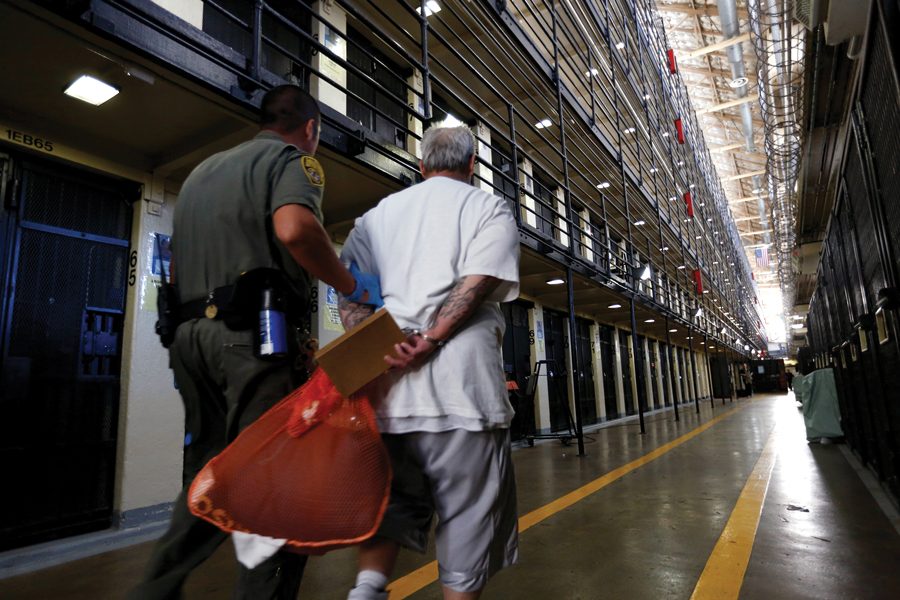Students, professors agree prison reform is needed
Source:Gary Coronado/Los Angeles Times/TNS
An inmate is escorted back to his East Block cell after spending time in the yard at San Quentin State Prison. Reducing the U.S. prison population now has bipartisan support.
October 24, 2018
Ahead of the November midterm elections, Daily reporters are speaking to voters about issues they’ll take to the polls. In this article, students and professors discuss prison reform.
The United States is home to about 4 percent of the world’s population, but about 22 percent of the world’s prisoners.
While mass incarceration may not captivate national attention like other issues do, it has significant implications for public safety and non-white communities.
According to the ACLU, 87 percent of Democrats and 57 percent of Republicans say it is important to reduce the prison population. Many Northwestern students agree.
Almost half of federal prisoners are incarcerated for drug offenses, according to a report from the Federal Bureau of Prisons. According to the Legal Action Center, most Americans believe that drug and alcohol addiction should be treated less criminally and more like a public health issue.
Medill senior Sarah Walther falls into that category, and said drug addiction should be treated like a mental health condition.
“According to studies, largely our prisons just make mental illness much, much worse and it forms a self-fulfilling cycle when those individuals are then released back into the general population,” Walther said.
Ayodeji Perrin, a fourth-year doctoral student in the political science program, added that rehabilitation should be about more than curing addiction, and also focus on assisting drug dealers in finding other forms of earning income once they have completed their prison sentence.
He also distinguished between how the system should treat drug addicts and drug dealers, and suggested that “people who are high enough up in the drug distribution food chain” should receive sentencing in addition to rehabilitation.
According to the ACLU, 71 percent of Americans agree that incarceration is often counterproductive to public safety, since longer prison sentences increase the chance that a person will commit more crime upon release.
In 2017, U.S. Sen. Dick Durbin (D-Ill.) and U.S. Sen. Chuck Grassley (R-Iowa) introduced legislation seeking to reduce sentences by reducing mandatory minimum sentences for certain offenses and give judges more discretion to lower sentences.
Philosophy Prof. Jennifer Lackey, who spearheads the Northwestern Prison Education Program, has seen firsthand the effect of lengthy sentences. She said she finds them not only to be significant problems, but also socially unproductive, due to the fact that people will be aging in prison, costing taxpayers money for hospice programs.
“Some of the lessons that have been most poignant for me are just the extent to which people can change, for instance,” Lackey said. “Many of the people who are incarcerated were convicted as teenagers, or very, very, very young people. And decades later don’t even themselves recognize their earlier selves.”
Communication freshman Moises Martinez took issue with the fact that, depending on specific state laws, felons can lose the right to vote. He added that private, for-profit prisons are immoral.
“I don’t think people need to make money off of the enslavement of others,” Martinez said. “It’s modern day slavery if you ask me.”
Perrin, however, was hesitant to decry the idea of a private prison system. He said that while he does not know enough about the issue, he is willing to accept the consensus that private prisons have been overall bad, but offered a more hopeful perspective on the system.
“Competition can lead to bad, worse outcomes, and maybe that’s what’s happening, but they can also lead to good outcomes,” said Perrin. “If the state says that the contract will go to the organization who can, assuming some certain level of cost, maximize a guard to prisoner ratios, can reduce drug use, can reduce recidivism… then I’m not opposed to privatization.”
Email: [email protected]
Twitter: @pamesjollard



